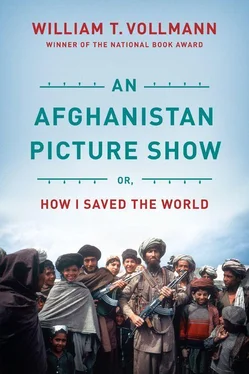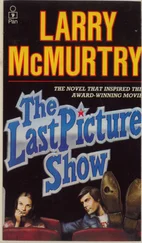When it was dark the man got him a rickshaw, paid his journey to Saddar for him in advance, and disappeared.
A QUESTION
Did the man do this for refugees, too? If so, for how many? And if not, why not?
ANOTHER QUESTION
Does asking the first question get at something useful, or is it an insult to the man’s simple kindness? And this tendency that I now have years later to recall the Young Man’s journey as a sort of failed Pilgrim’s Progress, does it give me a chance to make practical generalizations about how people ought or ought not to be, or was that my problem in the first place? If these memories were only “travel experiences” for you, the reader, to nibble at, would you like them better? Would that be a more honest presentation of the understatedness of life? For as it is, I have excavated and reworked what was once a random if picturesque trail into something resembling one of the freeways in my country, with road signs and billboards writhing with strange secret symbols. — And yet, encrusted though the route may be, I think, I hope it goes somewhere …
Statement of the Afghan waiter
In the days before he left his hotel room for the General’s, the Young Man spent time with an Iranian student at Peshawar University and his friend, a Jordanian. They were tormented people. The Iranian was effectively an exile, because upon hearing about Khomeini’s executions he’d gone to the Iranian consulate and torn up his passport. “Now they will put me in jail, maybe shoot me, if I go back,” he said. — The Young Man took a bus out to the Iranian’s apartment at Jabbar Flats, and they got a watermelon and the three of them sat on the bed and ate it. The Iranian and the Jordanian were outraged at the condition of the camps. — “Two, maybe three million Afghan refugees are living here!” the Jordanian shouted. “They don’t have shoes, they don’t have clothes, they don’t have food, they don’t have books for school; they don’t have anything! Every day they become more and more poor, and, you know, they have got only sickness over here.” —The Young Man was a little skeptical. For one thing, he recollected that according to both the World Health Organization and the Great Soviet Encyclopedia , in Afghanistan in 1965 (around that time the Soviets were offering the Afghans arms against the Pakistanis), thirty percent of the population had tuberculosis, ninety percent had helminthiasis, malaria was ubiquitous, and so was, let’s see, typhus … There were 1,564 cases of cholera; thirteen percent of the residents of Kabul had trachoma (this figure ascended as high as seventy-five percent in the rural areas); 30,000 people had leprosy; and of course the infant mortality was one out of two — so how could you blame the camps for disease? — On the other hand, with all the overcrowding, conditions were probably worse now. But how much worse? That he never found out. f
They introduced him to a refugee who had once been the editor of a prominent newspaper in Kabul. Now he drove a rickshaw and hauled loads on his back. He was in his sixties. — The Young Man asked him why he did not register as a camp inmate to collect the refugee allowance. The man stared at him; the Iranian had to explain that this Young Man was just an ignorant foreigner who had not seen the camps. “In the camp they must live like animals,” the rickshaw driver said in Pushtu. “They have no food, no water.” —The Young Man asked Mark Ice, the head of the International Rescue Committee’s office in Peshawar, what he thought about that. — “Well, they exaggerate,” said Ice. “I’ve never heard of anything like that. Now, it is true that the administration of the camps is divided up among sixteen voluntary agencies — Saudi Red Crescent, I.R.C. and so on — and some are run by the Pakistanis and are closed to foreigners. Conditions in the various camps do vary.”
Meanwhile, the Young Man still had not visited the camps. Every day he took the bus up to Jabbar Flats and talked with the two students in that bare concrete room that was now only patchily white, and the fan whirred and they stood pacing with their shirts off because it was so hot and the clock ticked very loudly. One day they said that the old rickshaw driver wanted the Young Man to meet his son. They went to a restaurant in which the pukkas roared futilely against the heat. Sweat rolled off everyone’s face onto the table. They ordered a Sprite apiece, and after ten minutes the Young Man had two more. It was a fancy place: with each soft drink the waiter brought salt and lemon.
The waiter was a man in his twenties. He was a very clean and graceful person who was constantly being called for by name among the clattering of teacups; all the patrons knew him, apparently. —“Abdul, tsalor Fanta!” gYes, it appeared that he was popular. He was summoned into the kitchen and to a front table and to a back table and into the kitchen. He was very energetic and always smiled as he came quickly to where he had been called. — In two hours, however, business had slackened, and he came over to the Young Man’s table to talk.
THE BANDITS
“When I was in Afghanistan my father has a little money, do you know?” began the waiter earnestly. “When we left Afghanistan we sold our furniture and some other things to come here. We walked three days without a stop. Russian soldiers are now living in our home. We came here; now I am working here. I get from here eight hundred rupees monthly. hI am working only for rent, from six o’clock morning until twelve o’clock midnight. We brought a little money with us from Afghanistan. And I think that after two, three months this money will be finished. And I ask myself, what will we do?” —He laughed. — “We cannot live in the camps. By God, we cannot! It is my mother and my sisters — how can she live? She cannot go out; everyone watches when she washes … For me it does not matter, but for her — most of the people of Afghanistan is religious. The poor womans, do you know, they don’t like the people or the foreign people looking at wife. For this reason we cannot stay in the camp. In the tent there is no water; there is nothing; it is very hot; this is very difficult. It is not safe.”
They called him to the kitchen. Apologetically, he laughed. The Young Man shut off the tape recorder and waited. He was almost alone in the restaurant now. The students had left some time ago, and there were only a couple of men at another table, eating kebabs and staring at him. They snapped their fingers and called for Abdul: Another Coke! — And now here he came back to the Young Man’s table, smiling brightly.
“What do you think the situation is like in Afghanistan now?” the Young Man said. “Is Mr. Karmal ifirmly in control?”
Abdul laughed. “Karmal is like a dog; he is like a dog of Russia, do you know? I think sometimes he want to kill himself. If he want to sleep, there is one Russian soldier always watching. They don’t have necktie: maybe he will die himself with his necktie.” —He laughed. — “In Afghanistan, Russian is everything, Afghanistan is nothing.” (How often Afghans said to the Young Man, “You are everything; I am nothing!”) “There is only Russian film and Russian dance on television,” he said. “In the government they don’t like us. But the soldiers don’t know. They think they are fighting against Pakistan, because when they came to Afghanistan the captain told them: ‘There is attack from Russia and China.’ These were Russian soldiers, but they didn’t know anything. He told them: ‘There are more than one million China in Afghanistan; they are against the government. They look like this: they have turban, they have beard, they have nose like this.’ ” (The waiter touched his own nose.) “The captain told them: ‘You kill them! You kill the Pakistan people because they want to attack Afghanistan.’ And then every person who is bad, who is from religion, they killed them.”
Читать дальше












